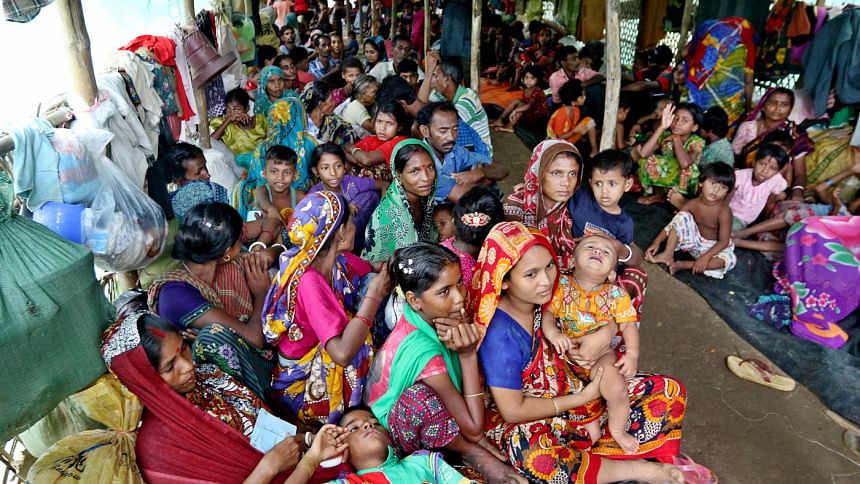Where is the international outcry?

The situation on the Bangladesh-Myanmar border is extremely volatile. Thousands of refugees are streaming into Bangladesh following fresh crackdowns on Rohingyas led by the Myanmar army. Hundreds of Rohingyas have been killed so far.
On August 25, 2017, the Arakan Rohingya Salvation Army (ARSA) simultaneously attacked 30 security posts and military bases in Rakhine. Over 100 people were killed in the attack including soldiers, policemen, civilians and militants. The Myanmar government has designated ARSA as a "terrorist organisation".
The timing of the attack is significant, first, because Myanmar's military operation against ARSA was imminent and second, because of the release of the Annan Commission report on August 23, 2017. ARSA said its attack was in self-defence and was aimed at pre-empting an escalating military crackdown on both the rebels and Rohingya civilians.
The ARSA attack has actually brought back the issue to international focus, showing that the Rohingya issue cannot be settled with the Annan Commission recommendations and that the military junta is guilty of crimes against humanity.
Among the 30 recommendations made by the Annan Commission, the most important one relates to the citizenship of "Muslims in Rakhine", which is the main cause of repeated violence between the Rakhines (i.e. Buddhists) and "Muslims". The Report recommended the review of the 1982 citizenship law. The Report does not mention the words "Rohingya" or "Bengali", as instructed by Aung San Suu Kyi. Annan neither said that the "Muslims" were from Bangladesh nor did he say that they were Myanmarese nationals (deprived of citizenship). It warned of the radicalisation of Rohingyas if they were continued to be denied basic rights.
Clearly it is a wishy-washy report, tailored for Suu Kyi's narrow political purpose. What else could one expect from a Commission of 9 members—6 of whom were handpicked by Suu Kyi? She thought she could deflect international criticisms by saying that Kofi Annan was working on a peace plan for Rakhine, while the international community gradually lost interest in the plight of the Rohingyas.
The report now is as good as dead—its recommendations cannot be implemented under the current circumstances. The junta probably also welcomed the attack—as it gave them a potent excuse to get rid of the Rohingyas from Rakhine. But the way the junta is going about expelling Rohingyas has rather invited international condemnation.
Soft peddling against an immoral xenophobic military clique is folly. This crisis has been simmering for decades, particularly since 2012. Bangladesh has lost the discourse by accepting Myanmar's terminology of Rohingyas as "Muslims of Rakhine". The term "Rohingya" has wide connotations—giving these people historical legitimacy and ethnic identity as a race that has political and human rights. By calling them "Muslims of Rakhine" Bangladesh has divested them of their ethnic identity. Myanmar has used two indicators to expel the Rohingyas—they speak the Chittagonian dialect and are Muslims.
Two UN Security Council meetings were called for by Britain—on 17 March and also on 30 August—to discuss the UN Human Rights Council's accusations that Myanmar's military was committing crimes against humanity. Both meetings failed to issue a formal statement as there was no consensus. Russia, backed by China, blocked the draft statement. Brandishing the Annan Commission report, Myanmar succeeded in persuading the Russian, Chinese and other P-5 delegations to block any statement. Bangladesh should have called for the UNSC meeting long ago and lobbied with the permanent members to censure Myanmar. Only a UNSC Resolution condemning Myanmar junta's operations against Rohingyas can stop the carnage.
Surprisingly, UN Security Council members, particularly America, continues to support Aung San Suu Kyi with the hope that she will strengthen democracy and set things right. Unfortunately, Suu Kyi cannot stop the massacre of Rohingyas against the decisions of the military junta.
It is not baffling to see India continuing to support Myanmar. With anti-Muslim Hindutva on the rise, Narendra Modi, instead of condemning the atrocities, has planned to deport 40,000 Rohingyas living in India. Modi, while visiting Naypyidaw (September 5-7) told Suu Kyi, "We share your concerns about extremist violence (meaning Islamic terrorism) in Rakhine state." Modi did not have the courage to ask Suu Kyi to stop the carnage in Rakhine. China too has been silent on the issue because of geostrategic interest and massive investments in Myanmar.
What is most worrying is the rise of ARSA—an insurgent group led by one Ataullah Abu Ammar Junjuni (40). It calls itself an army, equipped with modern weapons. ARSA rejected any link with transnational jihadi terror groups, and said it was committed to securing citizenship and basic human rights for the Rohingya Muslims.
Myanmar is already at war with more than a dozen insurgent groups along its borders. But the emergence of ARSA will be a game-changer for Myanmar. Islamic militants from al-Qaeda, ISIS and other jihadi outfits will most likely infiltrate ARSA and pose serious threats to Myanmar's security. ARSA's cross-border activities may also pose a security threat to Bangladesh. Myanmar's air force helicopters have already violated Bangladesh's airspace several times during the past weeks. UN Secretary General Antonio Guterres rightly warned that ethnic cleansing of Rohingyas could lead to regional destabilisation.
Myanmar has started a non-military aggression against Bangladesh. It has created a situation that can destabilise Bangladesh socio-economically. This is an issue which should have united all the political parties of Bangladesh (of all conviction) to demonstrate that Bangladesh is united against the persecution of Rohingyas. A politically divided country is not a strong nation. Adversaries always take advantage of such weaknesses. At this critical moment, the government should call for an all-party conference to condemn the atrocities against Rohingyas and figure out how to handle the situation.
The key to resolving the current crisis lies with the Myanmar junta, not Aung San Suu Kyi.
Mahmood Hasan is former Ambassador and Secretary.





Comments